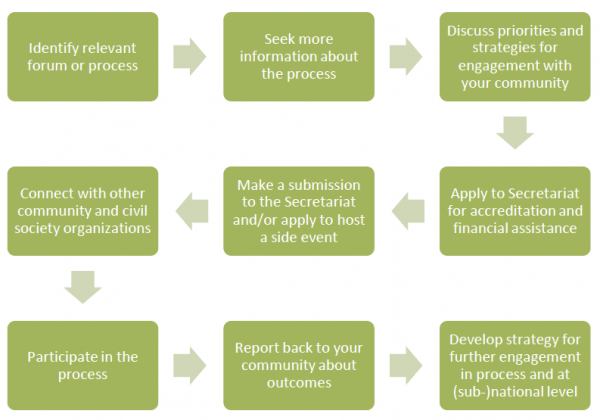A variety of international processes affect Indigenous peoples, local communities, and their territories and areas. These involve negotiations between governments and result in international law, which is comprised of legal instruments such as treaties, declarations, resolutions, recommendations, policies, programmes of work, and plans of action. Their implementation is supported by intergovernmental organisations such as UN Environment and the UN Development Programme.
International processes can initially seem painfully slow and far removed from the daily realities of community life. However, they can have a large influence on individual countries’ laws and policies, which in turn directly impact communities at the local level. It is thus critical for community members to participate strategically to ensure that the concerns and priorities outlined in their protocols are effectively represented. Engaging in international processes should be seen as a long-term investment that can yield potentially significant gains, particularly when these gains are actively used at the national and sub-national levels.

A number of steps are involved in participating in international processes, some of which are outlined in the Figure above. Since many community and civil society organisations that have gone through these steps before, you could connect with them to seek guidance and information about their experiences. After gaining accreditation and funding, one of the most important steps is to participate in the process itself. The other most important step is to report back to your community and further develop a strategy for engagement in relevant international and national processes. The ultimate value of an international process is how its outcomes are used at the local level to positively impact communities and the environment.
- Write a submission in response to a specific call for information. This submission will be considered by the Secretariat of the relevant process and potentially included in the information documents for Parties to consider during the negotiations.
- Attend coordination meetings and check in regularly with other community and civil society organizations. Within the Convention on Biological Diversity, the International Indigenous Forum on Biodiversity, the CBD Alliance and the Global Youth Biodiversity Network are the main coordinating bodies.
- Help prepare and read the opening statement, interventions throughout the negotiations, and the closing statement. These require a good understanding of the issues and politics of the negotiations, background research, and discussion with other community representatives in attendance.
- Discuss your views with government representatives (known as ‘Parties’) and lobby them to support your position. In many intergovernmental negotiations, community and civil society organizations require a Party to officially support their statements or interventions. You will get to know which Parties are generally supportive of community concerns and which ones are generally obstructive.
- Host a side event to present a positive community initiative or collaboration, or to raise concerns or questions about an issue that relates to the meeting. Prepare flyers and circulate reminders over email and in coordination meetings to increase the number of people in attendance.
(Disclaimer: the text and image above is adapted from “Biocultural Community Protocols: A Toolkit for Community Facilitators” (2012), edited by Holly Shrumm and Harry Jonas. Natural Justice: Cape Town.)
First published on 06/26/2017, and last updated on 06/28/2017
